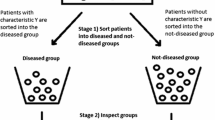Abstract
The core problem of both medicine and all biomedical research, which would also exist if all research had become reproducible, statistically correct, and exclusively patient-oriented, is the division of the human body organ by organ. Apart from you GP, for each organ, there is a specialist in charge (Fig. 9.1) and a clinical department. This is similar for the definition of diseases. For example, all diseases are classified using the International Statistical Classification of Diseases (ICD) for diagnoses in outpatient and inpatient care in Germany, both for diagnosis and for billing purposes with the health insurance funds. The ICD-10 is a mono-hierarchically structured classification for diagnoses with up to five hierarchical levels. The core area is formed by the organ-specific chapters. Within the ICD chapters, diseases are then named after a symptom in this organ (e.g. heart failure, heart attack, kidney failure, chronic obstructive pulmonary disease, gastritis, colitis, osteoporosis, myalgia, hearing loss, breast cancer, dermatitis) or—even slightly more weird—after the name of a doctor who first described the disease (e.g. Alzheimer’s, Parkinson’s, Crohn’s, Creutzfeldt-Jakob’s, Huntington’s, Meniére’s, Pfeiffer’s, Dupuytren’s, Wilson’s, etc.).
Access this chapter
Tax calculation will be finalised at checkout
Purchases are for personal use only
Similar content being viewed by others
Notes
- 1.
Structure of the four-digit detailed classification of ICD-10-GM. Federal Institute for Drugs and Medical Devices, https://www.dimdi.de/dynamic/de/klassifikationen/icd/icd-10-gm/systematik/systematik/
- 2.
List of specialist titles, DocCheckFlexikon, https://flexikon.doccheck.com/de/Liste_der_Facharztbezeichnungen
- 3.
Haendel M (2020) How many rare diseases are there? Nature Reviews Drug Discovery, 19:77–78, https://doi.org/10.1038/d41573-019-00180-y
- 4.
European Organisation for Rare Diseases (2005) Rare Diseases: Understanding This Public Health Priority, Paris, https://www.eurordis.org/IMG/pdf/princeps_document-EN.pdf
- 5.
Santos R et al. (2017) A comprehensive map of molecular drug targets. Nature Reviews Drug Discovery, 16:19–34, https://doi.org/10.1038/nrd.2016.230
- 6.
Niroomand F (2013) Cardiology: a way out of the crisis. Dtsch Arztebl, 110:A-1946/B-1721/C-1685, https://www.aerzteblatt.de/archiv/147784/Kardiologie-Ein-Weg-aus-der-Krise
- 7.
Cho J & Feldman M (2015) Heterogeneity of autoimmune diseases: pathophysiologic insights from genetics and implications for new therapies. Nat Med 21:730–738, https://doi.org/10.1038/nm.3897
- 8.
Kleinert S & Horton R (2018) After asthma: airways diseases need a new name and a revolution. The Lancet, 391:292–294, https://doi.org/10.1016/S0140-6736(17)32205-5
- 9.
Editors (2006) A plea to abandon asthma as a disease concept. The Lancet, 368:705, https://doi.org/10.1016/S0140-6736(06)69257-X
- 10.
Anderson GP (2008) Endoty** asthma: new insights into key pathogenic mechanisms in a complex, heterogeneous disease. Lancet 372:1107–19, https://doi.org/10.1016/S0140-6736(08)61452-X
Author information
Authors and Affiliations
Rights and permissions
Copyright information
© 2022 The Author(s), under exclusive license to Springer Nature Switzerland AG
About this chapter
Cite this chapter
Schmidt, H.H.H.W. (2022). Organ-Based Medicine. In: The end of medicine as we know it - and why your health has a future. Springer, Cham. https://doi.org/10.1007/978-3-030-95293-8_9
Download citation
DOI: https://doi.org/10.1007/978-3-030-95293-8_9
Published:
Publisher Name: Springer, Cham
Print ISBN: 978-3-030-95292-1
Online ISBN: 978-3-030-95293-8
eBook Packages: Biomedical and Life SciencesBiomedical and Life Sciences (R0)




